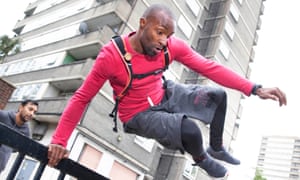The UK has become the first country in the world to officially recognise parkour as a sport.
Parkour, also known as freerunning or art du deplacement, involves negotiating terrain using only the natural strength of one’s body, principally through running, jumping and climbing surrounding features.
Recognition from all five UK sports councils, including Sport England, means organisations such as Parkour UK, which led the initial application for its recognition in 2009, will now be able to apply for government grants and National Lottery funding.
The sport could also soon be practised in schools after it gained support from both the Youth Sport Trust and the Association for Physical Education, who described it as an exciting and motivating activity.
Eugene Minogue, the chief executive of Parkour UK, said: “Recognition is a thing in its own right and that is what we are celebrating today, that the sport has been recognised as a sport. That’s no mean feat.
“Yes, it does give us the ability to apply for funding, and there are a number of other benefits that come out of it, but the biggest thing for us is how it will give the public an understanding of what parkour is and what benefits it has.”
Tracey Crouch, the minister for sport, welcomed the announcement. She said: “I want people to get out there and find the sport and physical activity that appeals to them and parkour is certainly a fun, creative and innovative option.
“I am pleased that it has been recognised as a sport, giving it the platform for further growth in this country, with Parkour UK as its governing body. The sport promotes movement and using the great outdoors as a space to get active in, and I encourage people to don their trainers and give it a go.”
The sport has often been deemed controversial since its inception in the late 1980s as a result of some participants’ use of techniques to scale urban structures without the aid of safety ropes.
Cambridge University has been particularly critical after a video went viral of 22-year-old James Kingston leaping across the city’s many ancient buildings. It labeled parkour a form of trespassing that endangered the health of its practitioners and the public.

Parkour developed principally in France, but one of its founding fathers and now an elected president of Parkour UK, Sebastien Foucan, said the UK was the first country to truly embrace the practice.
He is most recognisable for his role as Mollaka in the opening scene of the James Bond film Casino Royale, in which Daniel Craig chases him through a building site.
Foucan, who also appeared in some of Madonna’s music videos and starred in Jump London, a Channel 4 documentary, called the decision a “groundbreaking moment for a discipline which started off as child’s play and continues as child’s play for all ages”.
“Parkour/freerunning is not a known discipline,” he said. “It’s very, very famous now, but in terms of institutions, there was no recognition. And now, finally, this is the first place in the world [to see it as a sport], and it’s history. We’re making history. And I’m sure the UK is the pioneer of that.
“The beauty of parkour/freerunning is that everyone, of all ages, can do it respectfully in almost any environment. We celebrate activity and playfulness whilst constantly challenging our mental and physical limits. It is more than just jumping, it is a health-driven way of life.”
Phil Smith, the director of sport at Sport England, said: “Parkour has already been offering something different for a few years now, but what recognition means is that Parkour UK is taking responsibility for its organisation.
“The safety and enjoyment of those taking part is paramount, so congratulations to Parkour UK on achieving the standards and showing their ambition to grow even further.”



